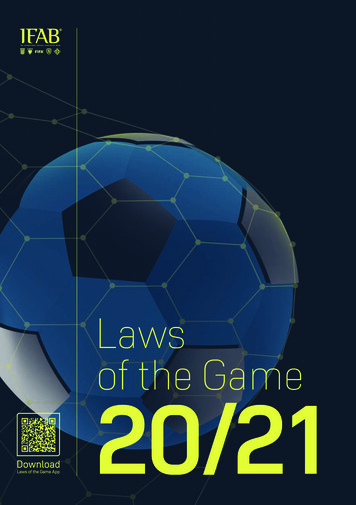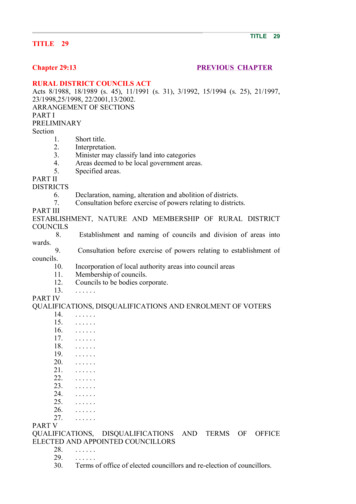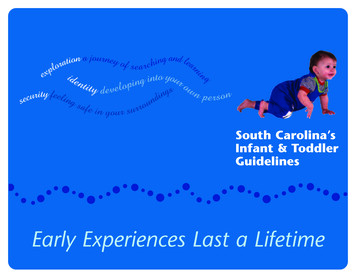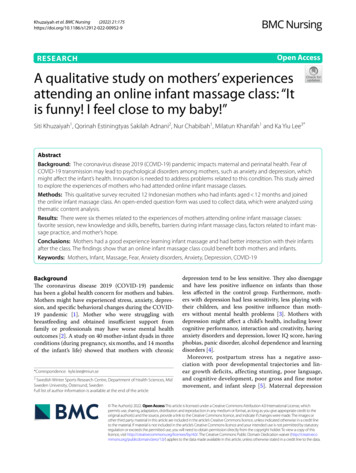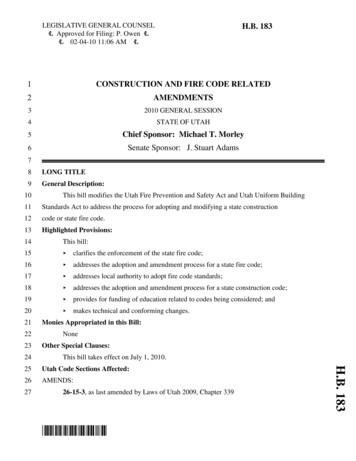
Transcription
STATE STATUTESCURRENT THROUGH SEPTEMBER 2021Infant Safe Haven LawsTo find statute information for a particular State, go to the State Statutes Search.Many State legislatures have enactedlegislation to address infant abandonmentand endangerment in response to reportsof newborn infants abandoned in unsafelocations, such as public restrooms or trashreceptacles. Beginning in Texas in 1999,"Baby Moses laws" or infant safe havenlaws have been enacted as an incentive formothers in crisis to safely relinquish theirbabies to designated locations where thebabies are protected and provided withmedical care until a permanent home isfound. Safe haven laws generally allowthe parent, or an agent of the parent, toremain anonymous and be shielded fromcriminal liability and prosecution for childendangerment, abandonment, or neglectin exchange for surrendering the baby to asafe haven.WHAT'S INSIDEWho may leave a baby at a safe havenSafe haven providersResponsibilities of safe haven providersImmunity from liability for providersProtections for parentsConsequences of ACF/HHSBureau/ACYF/ACF/HHS 800.394.3366 800.394.3366 Email: Email:info@childwelfare.govinfo@childwelfare.gov https://www.childwelfare.gov https://www.childwelfare.gov1
To date, all 50 States, the District of Columbia,Guam, and Puerto Rico have enacted safehaven legislation.1 The focus of these laws is onprotecting newborns from endangerment byproviding parents with an alternative to criminalabandonment; therefore, the laws are generallylimited to very young children. For example,in approximately seven States and PuertoRico, only infants 72 hours old or younger maybe relinquished to a designated safe haven.2Approximately 23 States and Guam acceptinfants up to 30 days old.3 Other States specifyvarying age limits in their statutes.4WHO MAY LEAVE A BABY AT ASAFE HAVENIn most States, either parent may surrenderhis or her baby to a safe haven. In four States,Guam, and Puerto Rico, only the mother mayrelinquish her infant.5 Idaho specifies that onlya custodial parent may surrender an infant.In the District of Columbia, an infant may berelinquished only by a custodial parent who isa resident of the District. In approximately 11States, an agent of the parent (someone withthe parent's approval) may take a baby to a safehaven for a parent.6 In California, Kansas, andNew York, if the person relinquishing theinfant is someone other than a parent, he orshe must have legal custody of the child.Eight States do not specify the person whomay relinquish an infant.7SAFE HAVEN PROVIDERSThe purpose of safe haven laws is to ensure thatrelinquished infants are left with persons whocan provide the immediate care needed for theirsafety and well-being. Approximately sevenStates require parents to relinquish their infantsonly to a hospital, emergency medical servicesprovider, or health-care facility.8 In 32 States,Guam, and Puerto Rico, fire stations also aredesignated as safe haven providers.9 Personnelat police stations or other law enforcementagencies may accept infants in 27 States andPuerto Rico.10 In 10 States, emergency medicalpersonnel responding to 911 calls may accept aninfant.11 In addition, five States and Puerto Ricoallow churches to act as safe havens, but therelinquishing parent must first determine thatchurch personnel are present at the time theinfant is left.12American Samoa, the Northern Mariana Islands, and the U.S. Virgin Islands currently do not address the issue of abandonednewborns in legislation.2The word "approximately" is used to stress the fact that States frequently amend their laws. This information is currentonly through September 2021. Alabama, California, Colorado, Hawaii, Michigan, Washington, and Wisconsin currently limitrelinquishment to infants who are no more than 72 hours old.3Arizona, Arkansas, Connecticut, Georgia, Idaho, Illinois, Indiana, Iowa, Kentucky, Maine, Montana, Nebraska, Nevada, NewJersey, New York, Ohio, Oklahoma, Oregon, Pennsylvania, Rhode Island, Utah, Vermont, and West Virginia4Other limits include 7 days (Florida, Massachusetts, Minnesota, Mississippi, New Hampshire, North Carolina, and Oklahoma),10 days (Maryland), 14 days (Delaware, Tennessee, Virginia, Wyoming, and the District of Columbia), 21 days (Alaska), 45 days(Missouri), 60 days (Kansas, Louisiana, South Carolina, South Dakota, and Texas), 90 days (New Mexico), and 1 year (North Dakota).5In Georgia, Maryland, Minnesota, and Tennessee, only the mother may relinquish her infant. Maryland and Minnesota do allowthe mother to approve another person to deliver the infant on her behalf.6Arizona, Arkansas, Connecticut, Indiana, Iowa, Kentucky, New Jersey, North Dakota, Rhode Island, Utah, and Wyoming7Delaware, Hawaii, Illinois, Maine, Nebraska, New Mexico, South Carolina, and Vermont8Alabama, Connecticut, Delaware, Idaho, Nebraska, Utah, and Virginia9Alaska, Arizona, Arkansas, California, Colorado, Florida, Georgia, Hawaii, Illinois, Kansas, Kentucky, Louisiana, Maine,Massachusetts, Michigan, Mississippi, Missouri, Montana, Nevada, New Hampshire, North Carolina, Oklahoma, Oregon, RhodeIsland, South Carolina, South Dakota, Tennessee, Vermont, Washington, West Virginia, Wisconsin, and Wyoming10Alaska, Arkansas, Georgia, Hawaii, Illinois, Kentucky, Louisiana, Maine, Massachusetts, Michigan, Missouri, Montana, Nevada,New Hampshire, New Jersey, North Carolina, North Dakota, Ohio, Oklahoma, Oregon, Rhode Island, South Carolina, SouthDakota, Tennessee, Vermont, Wisconsin, and Wyoming11Connecticut, Idaho, Illinois, Indiana, Iowa, Louisiana, Minnesota, New Hampshire, Vermont, and Wisconsin12Arizona, Kentucky, New Hampshire, South Carolina, and Vermont1Children’s Bureau/ACYF/ACF/HHS 800.394.3366 Email: info@childwelfare.gov https://www.childwelfare.gov2
Laws in nine States13 allow a parent tovoluntarily deliver the infant to a newbornsafety device. A "newborn safety device," whichis also sometimes referred to a "newborn safetyincubator" or "baby box," is a medical deviceused to maintain an optimal environment forthe care of a newborn infant. A newborn safetydevice must meet these requirements: It is physically located inside a safe havensite, which may include a hospital, lawenforcement agency, or fire department, thatis staffed 24 hours a day by a medical servicesprovider. It is located in an area that is conspicuous andvisible to the employees of the safe haven site. It must allow a child to be placedanonymously from outside the facility. It must lock after a child is placed in it so aperson outside the facility cannot accessthe child. It must provide a controlled environment forthe care and protection of the child. It must notify a centralized location in thefacility within 30 seconds of a child beingplaced in the device. It must trigger a 911 call if staff at the facilitydo not respond within a reasonable amountof time after a child is placed in the device.RESPONSIBILITIES OF SAFE HAVENPROVIDERSThe safe haven provider is required to acceptemergency protective custody of the infant andprovide any immediate medical care that theinfant may require. In 18 States, the District ofColumbia, Guam, and Puerto Rico, when thesafe haven receiving the baby is not a hospital,the baby must be transferred to a hospital assoon as possible.14 In 43 States,15 the Districtof Columbia, Guam, and Puerto Rico, statutesrequire the provider to notify the local childwelfare department that an infant has beenrelinquished. In eight States16 and Guam, thelocal law enforcement agency must be notified.In 24 States, the District of Columbia, andGuam, the provider is required to ask the parentfor family and medical history information.17In Montana and New Mexico, the providermust ask about the family's Tribal affiliation.In 17 States, the District of Columbia, andGuam, the provider is required to attempt togive the parent or parents information aboutthe legal repercussions of leaving the infantand information about referral services.18 Infour States and Guam, a copy of the infant'snumbered identification bracelet may beoffered to the parent as an aid to linking theparent to the child if reunification is sought ata later date.19Arkansas, Indiana, Kentucky, Louisiana, Maine, Missouri, Ohio, Oklahoma, and PennsylvaniaArizona, Florida, Illinois, Iowa, Kansas, Kentucky, Louisiana, Maryland, Michigan (when the infant needs medical care),Minnesota, Missouri, Montana, Nevada, New Jersey, Pennsylvania, South Carolina, West Virginia, and Wyoming15Alabama, Alaska, Arizona, Arkansas, California, Colorado, Connecticut, Florida, Georgia, Hawaii, Illinois, Indiana, Iowa,Kentucky, Maine, Maryland, Massachusetts, Minnesota, Mississippi, Missouri, Montana, Nebraska, Nevada, New Hampshire, NewJersey, New Mexico, North Carolina, North Dakota, Ohio, Oklahoma, Oregon, Pennsylvania, Rhode Island, South Carolina, SouthDakota, Tennessee, Texas, Utah, Vermont, Washington, West Virginia, Wisconsin, and Wyoming16Colorado, Hawaii, Idaho, Illinois, Kansas, Nevada, Pennsylvania, and Vermont17Alaska, California, Connecticut, Delaware, Hawaii, Iowa, Kentucky, Louisiana, Maine, Massachusetts, Michigan, Montana,North Carolina, North Dakota, Ohio, Oklahoma, Pennsylvania, South Carolina, South Dakota, Tennessee, Texas, Utah,Washington, and Wyoming18Connecticut, Delaware, Hawaii, Illinois, Kentucky, Louisiana, Michigan, Montana, New Mexico, North Dakota, Ohio, Oklahoma,Rhode Island, South Carolina, Tennessee, Washington, and Wisconsin19California, Connecticut, Delaware, and North Dakota1314Children’s Bureau/ACYF/ACF/HHS 800.394.3366 Email: info@childwelfare.gov https://www.childwelfare.gov3
IMMUNITY FROM LIABILITY FORPROVIDERSIn 45 States, the District of Columbia, andGuam, safe haven laws protect providers whoaccept custody of relinquished infants withimmunity from civil liability for anything thatmight happen to the infant while in their careunless there is evidence of major negligenceon the part of the provider.20 In 35 States,21the District of Columbia, and Guam, safehaven laws also protect providers withimmunity from criminal liability.PROTECTIONS FOR PARENTSIn approximately 17 States, the District ofColumbia, and Guam, anonymity for theparent or agent of the parent is expresslyguaranteed in statute.22 In 39 States, theDistrict of Columbia, Guam, and Puerto Rico,the safe haven provider cannot compel theparent or agent of the parent to provideidentifying information.23 In addition, 17States and Guam provide an assurance ofconfidentiality for any information that isvoluntarily provided by the parent.24Besides the guarantee of anonymity, mostStates provide protection from criminalliability for parents who safely relinquishtheir infants. Approximately 34 States, theDistrict of Columbia, and Puerto Rico do notprosecute a parent for child abandonmentwhen a baby is relinquished to a safe haven.25In 14 States, safe relinquishment of the infantis an affirmative defense in any prosecutionof the parent or his/her agent for any crimeagainst the child, such as abandonment,neglect, or child endangerment.26The privileges of anonymity and immunity areforfeited in most States if there is evidence ofchild abuse or neglect.CONSEQUENCES OFRELINQUISHMENTOnce the safe haven provider has notifiedthe local child welfare department thatan infant has been relinquished, thedepartment assumes custody of the infantas an abandoned child. The department isresponsible for placing the infant, usuallyin a preadoptive home, and petitioning theAlabama, Alaska, Arizona, Arkansas, California, Colorado, Delaware, Florida, Georgia, Hawaii, Idaho, Illinois, Indiana (limitedto use of newborn safety devices), Iowa, Kansas, Kentucky, Louisiana, Maine, Maryland, Michigan, Minnesota, Mississippi,Missouri, Montana, Nevada, New Hampshire, New Jersey, New Mexico, North Carolina, North Dakota, Ohio, Oklahoma,Oregon, Pennsylvania, Rhode Island, South Carolina, South Dakota, Tennessee, Texas, Utah, Vermont, Virginia, Washington,Wisconsin, and Wyoming21Arkansas, California, Colorado, Florida, Georgia, Hawaii, Idaho, Illinois, Iowa, Kansas, Kentucky, Louisiana, Maine,Maryland, Minnesota, Missouri, Montana, New Jersey, New Mexico, North Carolina, North Dakota, Ohio, Oklahoma, Oregon,Pennsylvania, Rhode Island, South Carolina, South Dakota, Tennessee, Utah, Vermont, Virginia, Washington, Wisconsin, andWyoming22Arizona, Delaware, Florida, Illinois, Indiana, Kansas, Kentucky, Mississippi, Missouri, Ohio, Oklahoma, South Carolina, Texas,Utah, West Virginia, Wisconsin, and Wyoming23Alaska, Arizona, California, Connecticut, Delaware, Hawaii, Idaho, Indiana, Iowa, Kansas, Kentucky, Louisiana, Maine,Massachusetts, Michigan, Minnesota, Mississippi, Missouri, Montana, Nevada, New Hampshire, New Jersey, New Mexico,North Carolina, North Dakota, Ohio, Oklahoma, Oregon, Rhode Island, South Carolina, South Dakota, Tennessee, Texas, Utah,Vermont, Washington, West Virginia, Wisconsin, and Wyoming24Arkansas, California, Connecticut, Delaware, Idaho, Iowa, Maine, Michigan, Mississippi, Mississippi, Montana, Rhode Island,South Carolina, Tennessee, Texas, West Virginia, and Wisconsin25Alaska, Arizona, California, Connecticut, Florida, Georgia, Hawaii, Idaho, Illinois, Iowa, Kansas, Kentucky, Louisiana,Maryland, Massachusetts, Minnesota, Missouri (for a child younger than 45 days old), Montana, Nebraska, Nevada, NewMexico, North Carolina, North Dakota, Ohio, Oklahoma, Pennsylvania, Rhode Island, South Carolina, South Dakota, Tennessee,Texas, Vermont, Washington, and Wisconsin26In a State with an affirmative defense provision, a parent or agent of the parent can be charged and prosecuted, but the actof leaving the baby safely at a safe haven can be a defense to such charges. The States with an affirmative defense provisioninclude Alabama, Arkansas, Colorado, Delaware, Indiana, Maine, Michigan, Mississippi, New Jersey, New York, Oregon, Utah,Virginia, and Wyoming.20Children’s Bureau/ACYF/ACF/HHS 800.394.3366 Email: info@childwelfare.gov https://www.childwelfare.gov4
court for termination of the birth parents'parental rights. Before the baby is placed ina preadoptive home, 18 States, the District ofColumbia, and Guam require the departmentto request the local law enforcement agency todetermine whether the baby has been reportedas a missing child.27 In addition, six Statesrequire the department to check the putativefather registry before a termination ofparental rights petition can be filed.28 InMontana, New Mexico, and South Dakota,the appropriate Tribe must be notified ifthere is reason to believe that the infant is aNative American child.Approximately 21 States, the District ofColumbia, and Guam have procedures in placefor a parent to reclaim the infant, usually withina specified time period and before any petitionto terminate parental rights has been granted.29This publication is a product of the StateStatutes Series prepared by Child WelfareInformation Gateway. While every attempthas been made to be complete, additionalinformation on these topics may be inother sections of a State's code as wellas in agency regulations, case law, andinformal practices and procedures.SUGGESTED CITATION:Child Welfare Information Gateway. (2022).Infant safe haven laws. U.S. Department ofHealth and Human Services, Administrationfor Families, Children's Bureau. spolicies/statutes/safehaven/Five States and the District of Columbia alsohave provisions for a nonrelinquishing parent topetition for custody of the child.30 In 19 States,the District of Columbia, Guam, and Puerto Rico,the act of surrendering an infant to a safe havenis presumed to be a relinquishment of parentalrights to the child, and no further parentalconsent is required for the child's adoption.31Arkansas, California, Delaware, Hawaii, Idaho, Illinois, Indiana, Kentucky, Louisiana, Montana, Nevada, New Hampshire, NewJersey, Oklahoma, South Carolina, Texas, Utah, and Wyoming28Illinois, Iowa, Kansas, Missouri, Utah, and Wyoming29California, Connecticut, Delaware, Florida, Hawaii, Idaho, Illinois, Iowa, Kentucky, Louisiana, Michigan, Missouri, Montana,Nevada, New Mexico, North Dakota, Ohio, Oklahoma, Tennessee, Wisconsin, and Wyoming30Iowa, Missouri, Montana, South Dakota, and Tennessee31Alaska, Delaware, Florida, Idaho, Illinois, Kansas, Kentucky, Michigan, Mississippi, Missouri, Montana, Nevada, Rhode Island,South Carolina, South Dakota, Tennessee, Utah, West Virginia, and Wisconsin27U.S. Department of Health and Human ServicesAdministration for Children and FamiliesAdministration on Children, Youth and FamiliesChildren’s BureauThis material may be freely reproduced and distributed. However, when doing so, please credit Child Welfare Information Gateway.This publication is available online at s-policies/statutes/safehaven/.Children’s Bureau/ACYF/ACF/HHS 800.394.3366 Email: info@childwelfare.gov https://www.childwelfare.gov5
(Missouri), 60 days (Kansas, Louisiana, South Carolina, South Dakota, and Texas), 90 days (New Mexico), and 1 year (North Dakota). 5 . In Georgia, Maryland, Minnesota, and Tennessee, only the mother may relinquish her infant. Maryland and Minnesota do allow the mother to approve another person to deliver the infant on her behalf. 6
